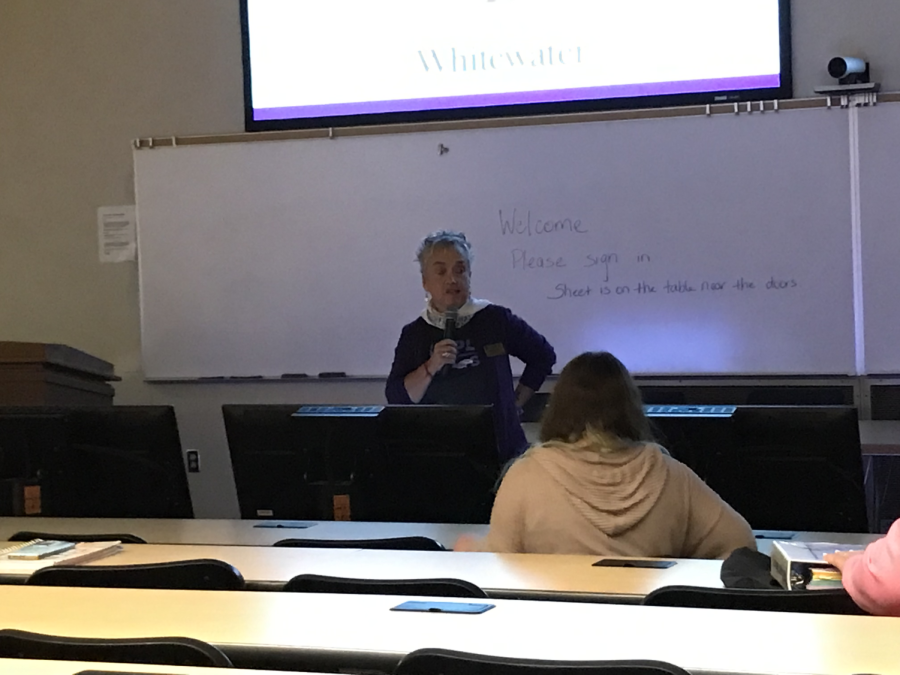Summit on Sexual Assault Awareness and Prevention
‘Each of us has a responsibility to take something from this summit’
Interim Provost Robin Fox Speaks before Attendees at the Sexual Assualt Awareness Summit Friday, Oct. 7 in Winther Hall.
October 9, 2022
The first Chancellor’s Summit on Sexual Assault Awareness and Prevention was held at the Winther Hall in room 2001 with a small group of university administrators and student organization leaders in attendance. The summit was held at the request of the Whitewater Student Government which has been working with leadership over the past year on initiatives specifically addressing sexual assault and prevention in efforts to make the campus a safer place.
The event consisted of several guest speakers from the Wisconsin Coalition Against Sexual Assault (WCASA), and New Beginnings APFV, as well as faculty from the UW-W Women and Gender Studies department. Interim Provost Robin Fox acted as MC, announcing speakers and breaks during the summit.
In Interim Chancellor Chenoweth’s opening remarks, he made a point to highlight data from the National Sexual Violence Resource Center which according to their reports says that 81% of women and 46% of men reported experiencing some form of sexual harassments and or assault in the United States.
“Each of us has a responsibility to take something from this summit,” said Chenoweth. “By challenging each and every member of our community to take action to prevent this from occurring we create a safer and a healthier campus.”
Both WCASA are partners with the university in offering sexual assault resources and support for students on campus which are listed on the UHCS website. WCASA not only works to provide resources to sexual assault survivors, but also works to to advocate and encourage state and national legislature to push for laws that work to prevent further harm of individuals that fall victim to sexual violence and provide adequate funding to support organizations like the Sexual Assault Victim Services.
Suzi Schoenhoft Executive Director of New Beginnings, another organization currently partnering with campus, also spoke at the event telling of the work they do for sexual assault survivors and victims of violent crimes.
Dr. Ellie Schemenauer also from the Women’s studies department also gave a presentation of the importance of the women’s studies department in providing a well-rounded view of the societal influences on sexual violence based around the Social Ecological Model. Dr. Ashley Barnes-Gilbert also of the UW-W Women’s studies department gave an in depth presentation on the history of UW-Whitewater’s history of sexual assault prevention committees and awareness groups on campus. Banres-Gilbert served as the co-chair of the university’s Sexual Assault Prevention Advisory Committee (SAPA) and now which evolved from several past teams established on campus like the Sexual Assault Response Team (SART). SART was run by Marilyn Kyle and was at the forefront of preventing sexual violence on campus and immediate emergency response to those who had been sexually assaulted on campus. This work resulted in UW-Whitewater being named the top 25 affirmative consent campuses in the nation. After Kyle’s retirement in 2011, leadership roles changed and initial SART evolved into the Sexual Assault Survivor Assistants (SASA) which offered survivor support services, but disbanded in 2013. Barnes-Gilbert also highlighted that services on campus have been more crucial than ever. Since the pandemic the number of reported sexual violence crimes on college campuses across the nation have risen exponentially with studies being published in the American Psychological Association on the rising numbers. SAPA now is working with UHCS, WCASA, and New Beginnings as a new support network for students on campus. SAPA also is working with student organizations such as IMPACT and Active Minds offering sexual assault awareness programing on campus.
“I think the conversations we are having today are essential to the future of this university,” said Dr. Barnes Gilbert. “This institution has a long and storied history and we have models for how to do this very important work in making our campus and community a safer place.”













